The Most Interesting Characters in American Horror Story: NYC
Warning: This article contains spoilers for Episodes 1-4 of American Horror Story: NYC
Ryan Murphy and Brad Falchuk have spent more than a decade plunging us into the minds of others. They've shown us firsthand the desperation of dying witches, the vanity of vicious nuns, and the bloodlust of vampiric fashionistas. They'll analyze the human condition, and create detailed monologues about life and death--anything and everything to make us feel exactly what their characters are feeling. It's never been about the horror. It's the demented and misshapen creatures that grace the screen--human or otherwise--and what's going on inside their heads.
They've moved heaven and earth to find us protagonists we can love and villains we love to hate, and this season is no different. AHS: NYC is a deep dive into gay New York City circa 1981. It was the year the AIDS virus entered the spotlight, when serial killers were picking gay men off in the darkness, and the streets were filled with walls of trash ten feet high. We've lurked through the fog in bathhouses, and seen men picked up in leather bars, and we've met some compelling individuals along the way. Let's take a closer look at them, who they are, and what drives them before they disappear.
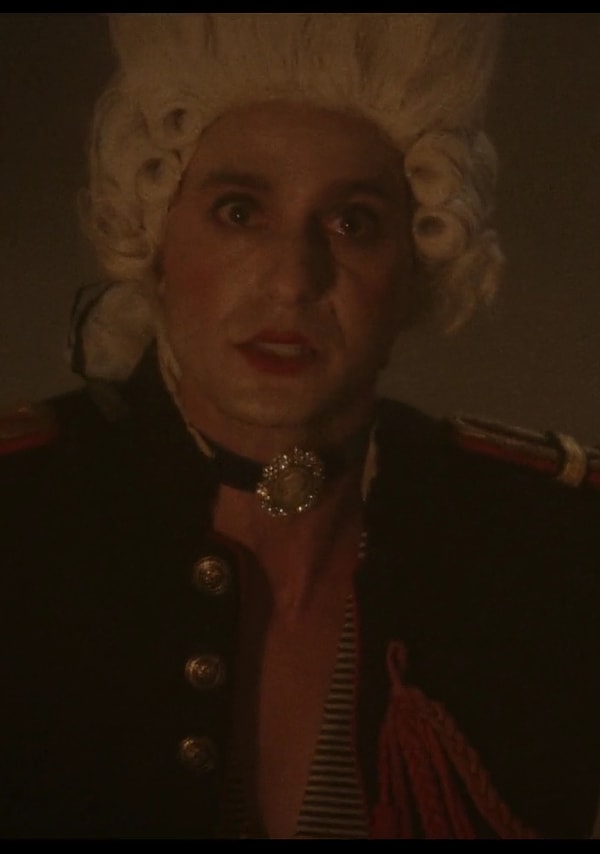
Courtesy of FX via Hulu
Cameron
Death is our dinner companion.
- Cameron, Episode 2 'Thank you for your service'
Cameron may be a minor player in the season, but in the New York club scene, he was a star. He's based off of the recently deceased event promoter, Michael Alig, the queen of the Club Kids from the late 80s and 90s. In 1997, Alig was sentenced to 10-20 years for killing his drug dealer Andre Melendez. The murder was portrayed in the cult classic Party Monster. In the film, Macaulay Culkin affected the same refined accent used by Gideon Glick, who plays Cameron. Both Alig and Cameron were known for their drug-laden bacchanalias, known as outlaw parties.
When we're first introduced to Cameron, he's said to a be rich a**hole holding a party in a warehouse outside the city. He supposedly liked the contrast between the decadence and the squalor. He filled the warehouse with cats rescued 'from the concentration camps of the ASPCA.' They all had fleas and mange, and they were scattered about drinking from martini glasses, sitting next to piles of coke. Most of the partygoers were dressed in powdered wigs, dancing to a club beat while a gothic clown named Hans screeched out a song about mommy and daddy's milk. It wasn't just a party. It was art.
When Hans finished his performance, Cameron handed over the cat he was holding and gracefully took to the stage. He announced that he was going to read a poem. He grabbed a piece of parchment from between a naked stagehand's butt cheeks, then injected a clear liquid into his hand. He hunched over, eyes closed, and shouted, 'Fuck the badges! Fuck the norms!' He strutted the stage, one finger in the air. 'Death is our dinner companion. Who else wants to eat with us? Listen to the oracles. Listen to the outlaws. They tell us..' He affected a menacing, singsong tone and pointed at the main character, Adam, who was standing in the back watching. 'Something is coming. Something evil on the horizon. Something is coming for you.' This is the second time Adam had heard this. The first time it came from a woman sitting on the subway. She seemed to be talking to herself, as if she might be schizophrenic, saying that Jesus couldn't save them from the bomb. The lights went out and suddenly she was sitting across from him saying that something was coming. The series has already introduced psychism and warlocks. It's possible that the drug Cameron took made him tap into the astral realm. The woman on the subway might have been able to do the same thing because of her hallucinations. Some people believe drugs and psychosis can make you sensitive to those things. The one thing we know for certain about Cameron is that he is a glutton, and that characterizes his philosophy in life. When Hans died and his lover showed up to accost the partygoers at Cameron's second party, Cameron announced that all of the urges they were giving into were good. He believes in indulging himself, and he loves being around sex and drugs. When he walks through a cruise spot with Hans' lover, he announces that it's like walking through a bakery. Even if you don't buy something, you still get to enjoy the sights and smells.
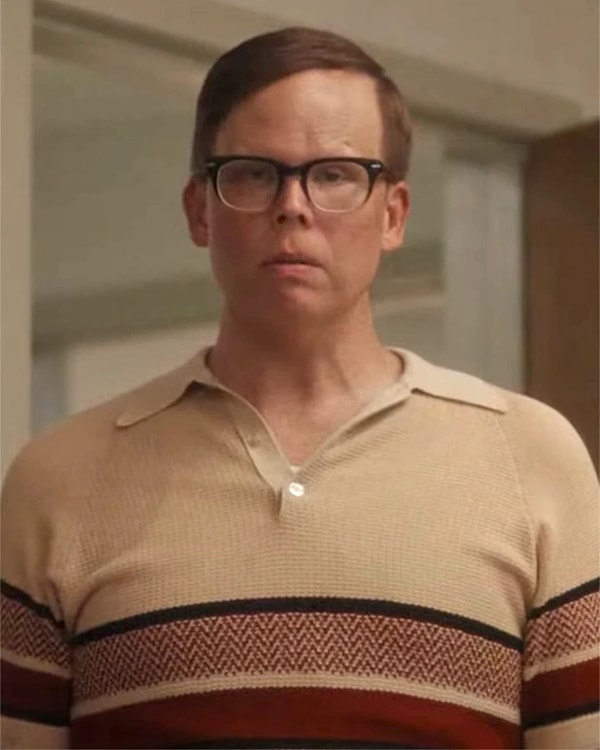
Courtesy of FX via Hulu
Mr. Whitely
There's so much pain in all of us. I want to make that legible.
- Whitely, AHS: NYC Episode 2, 'Thank You For Your Service
Whitely is a strange creature. He's played by Jeff Hiller, a lesser-known theatre actor who co-starred in the TV series Somebody Somewhere. In AHS, he has weird glasses. He wears hushpuppies--comfortable flats with tassels, popular with elderly women--and he has a giant forehead, perpetually slick with sweat, like something is dripping out of his pores. This could be a sign of cannibalism, which makes sense considering he takes home a human head, and he made the same excuse as Dahmer when someone noticed the smell. We are first introduced to him in the second episode. A headless corpse had shown up in the Hudson, and the protagonist Gino Barelli went to The Brownstone Bar, a piano bar in Manhattan, to investigate the disappearance. He speaks with an elderly queen who claims to have seen the killer, and someone sends him a mai tai with a little pink umbrella. He takes a sip and stumbles outside, realizing that he had been drugged. Someone picks him up and puts him in a car and takes him back to Whitely's apartment. When he wakes up, Whitely is vacuuming the floor. He notices that Gino is awake and injects him with something to put him back to sleep. When Gino wakes up again, he is gagged and shrieking. Whitely runs a syringe through a flame and shoves it beneath Gino's nailbeds. He says that there is a lot of pain in the gay community, and he wants to make that legible. He had been dismembering men, but he thought that was a mistake. He needed to give 'them' bodies. He adds that there's a war coming, and it will fix some things. He seems to be using a lot of hospital equipment. There's a metal tray and medical scissors, which he uses to open Gino's shirt. When he sees that Gino has a military tattoo, he says that Gino can't serve twice, and decides to let him go.
There's not much information about Whitely, other than his penchant for eccentric speeches. He seems to be somewhere between his mid-30s to early 40s, but it's difficult to tell. He's a Vietnam War veteran, which would mean he could be slightly younger. He claims to have ridden around in a tank, and he talks about his time in the service quite a bit. It's likely that it affected him somehow. His M.O. is pretty simple. He orders men mai tais at bars around town, then drags them back to his apartment. That's why they call him the mai tai killer.
It may turn out that Whitely has experience as a medic or a job at a hospital. He's based on the Last Call Killer, Richard Westall Rogers Jr. who loved piano bars. He'd go out, pick up men, and bring them back to his apartment just like Whitely would. Two men did wake up and escape while he was trying to kill them. The scene with Gino was modeled after those incidents, which occurred in 1988 and 1998. The NYPD was notoriously complacent when it came to finding Richard. He was active during the 70s, 80s, and 90s, but they didn't pick him up until 2001--and that was only after a victim's wife hired a private investigator. That was just one of the many ways the system failed Roger's victims. He killed an elderly woman in the 60s, and they let him get away with time in an institution. In the 70s, bashed his roommate over the head eight times with a hammer and strangled him to death with a plastic bag. Both the judge and jury allowed him to walk away without charges. He even got caught drugging a man in his apartment, and they let him go. After that, he was able to get a job as a pediatric surgical nurse--of all things. This was before background checks were common. Rogers' medical career and the medical equipment in Whitely's apartment do seem to correlate somehow, so keep watch. It will probably come up again. We can also match Whitely with the Bag Murders, which occurred between 1975-1977.
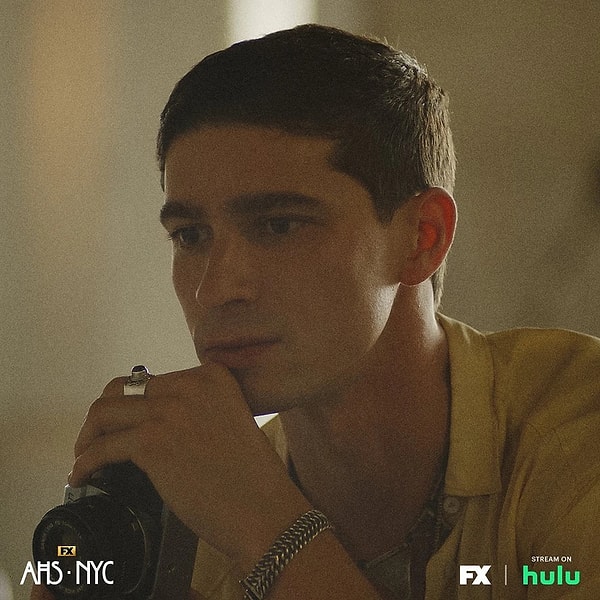
Courtesy of FX via Hulu
Theo Graves
That's just sex. That's just a combination of biology and ego. It has nothing to do with love.
-Theo Graves, Episode 2 'Thank you for your service'
Theo is the season's heartthrob. His chest is rarely covered and always glistening--or oiled up; it's hard to tell, but with those muscles, nobody seems to mind. It's his baby face and his short hair. He's so slick and charming. He could tell someone to f*ck off, and it would sound like 'I love you.' There's a lot to say about him, but first, let's welcome the actor who plays him, Isaac Powell, to the stage and allow him to take a bow. He's amazing, and he has some of the best lines in the season--all executed flawlessly, of course.
Theo is every bit a gay man of his time, fresh out of the sexual revolution. He's flighty but pragmatic, down-to-earth, and sensible. He goes for what he wants, and he ignores everything else. He frequents bathhouses, bars, and Cameron's parties, picking up anyone worth his time, and he's perpetually binging on cocaine. He's a famous photographer with the soul of an artist. He used to take pictures of ugly things, like scrotums and men wearing jockstraps on their head. He said that whenever someone saw something grotesque, he saw the beauty in it. He moved on to photographing flowers and waterdrops, 'exposing the perverted in what everyone else sees as beautiful.'
It's unclear whether he is a proper warlock or not, but his grandmother was a psychic in Haiti who was labeled a witch. He was her favorite because she passed her powers on to him. As a result, he can see things that no one else can see. He believes that something dark is coming. He can sense it when he walks the street, and it disturbs him, like a bad psychedelic trip. He can't focus on it. His boyfriend, Sam, a sadomasochist with a dark streak, pays for his lifestyle, and he has a lot of rich clients who want artsy pornography--specifically extreme anal penetration. But Theo feels like he can't put his heart into that. The darkness is there, so to speak, lurking in that realm, and he feels like it will swallow him up. So he's focusing on the obvious beauty in things, like a Thomas Kinkade painting instead of Dali surrealism. It's like his psychic senses move through a realm of their own, melding with the energies around them and that can affect his psyche somehow.
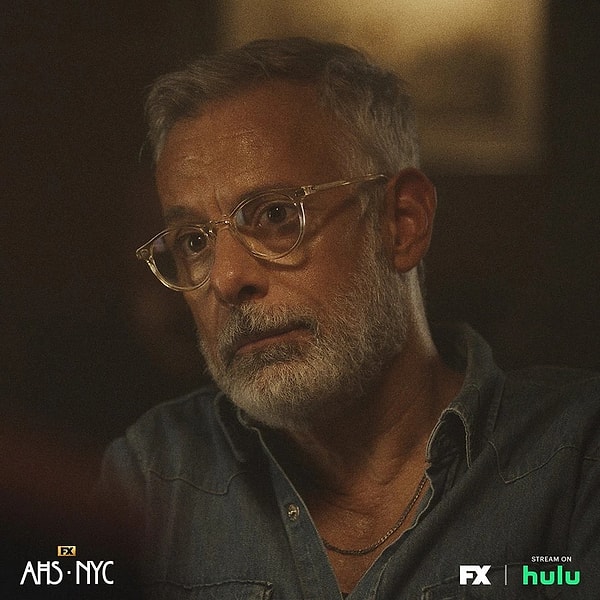
Courtesy of FX via Hulu
Gino Barelli
Do you know what it's like to have hot needles hammered into your nail beds?
-Gino Barelli, Episode 2 'Thank you for your service'
Gino is that queen, the one that won't stop asking questions, who lights fires, and protects himself and the ones he loves. He's been there, done that. He knows the gay community and the nature of the beast, and he doesn't have time for games. He's got a killer to catch. He's bitter. He's old, and he's pragmatic to the point of cynicism. We know what we get from the guy. It's not about who he is. It's about his journey.
He's based on two separate reporters: Lawrence Mass, from the New York Native, and Andrew Bell, who worked for the Village Voice, both in the same era. The paper where Gino works, the New York Native, was a real publication in the 1980s. They were one of the first to report on the AIDS virus in '81. A gay man overheard his doctor talking about a new disease--some type of pneumonia--that homosexuals were catching. He ran to Lawrence Mass at the Native, who seemed to be rather skeptical. Lawrence agreed to do the story, but his headline says a lot: 'Disease Rumors Largely Unfounded.' At the time, the CDC was already working on a study, and the NYT was about to break the newsstands. But not Lawrence--and potentially not Gino, who doesn't have the friendliest relationship with the lesbian activist Fran, who appears to be speaking out against biological warfare.
Andrew Bell is another interesting historical figure, who seemed to value the rights of his community greatly. He was known for writing about the historic Stonewall Riots in 1969, which are sometimes credited with kicking off the gay rights movement. He later went on to write about the Bag Murders, which is where Gino comes in. From 1975-1977 roughly six male bodies were found dismembered in the Hudson. They were assumed to be gay because of the leather clothing items they were wearing, which matched items from a shop in Greenwich Village. We'll never know. They were mixed together, torn apart, and decaying, and back then forensics could hardly be called a science. When Bell got word of this, he sounded the alarm on the NYPD. Gay people were disappearing. There were punks raiding people outside of bars, homophobes--and yes, serial killers; there was a long list of missing persons, and the NYPD wouldn't hear a word of it. It was prejudice, plain and simple--both the violence and the police negligence. The LGBTQ+ community has long struggled with violence and cruelty from the boys in blue. At times, they fought openly. Many people have died, and by that point, the community had had it. Bell lit a fire just like Gino. He wrote a scathing series of articles on hate crimes and the NYPD's blatant refusal to protect them from serial killers. He talked about how they lost records, how reports weren't being filed, and how they couldn't get any cooperation. It worked. People knew that gays had a target on their back, and they knew the cops hated them. It was obvious, and they couldn't deny it. Bell actually succeeded at getting sympathy for gay men in the early 1980s and late 70s--not an easy feat. Bell's journey is much longer than this small summary. It gets interesting, and it will likely be tied with Gino's. They look and act nothing alike, but they still share a lot.
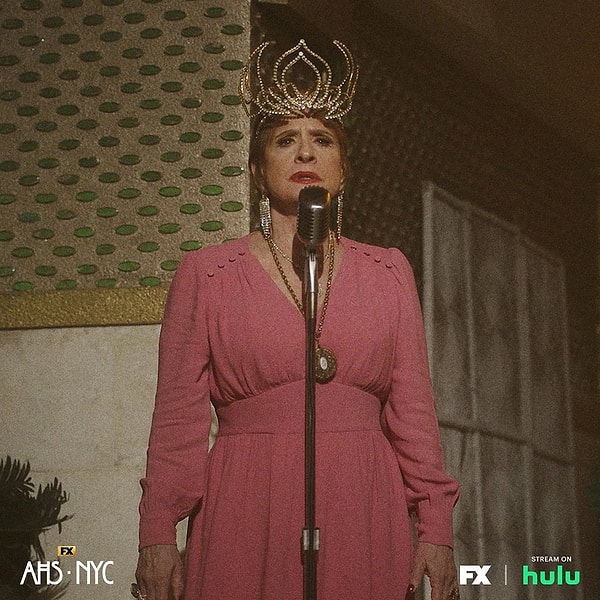
Courtesy of FX via Hulu
Kathy Pizazz
We get one ambulance in here a month, and we have to call in a favor to get it.
-Kathy, Episode 4, 'Blackout'
We don't know much about Kathy, but we will as time goes on. Like the actress who plays her, Patti Lupone, she was a Broadway singer of Sicilian descent, who once worked at the Plymouth. She's now a singer--and possibly the owner--at Neptune Baths, a veritable buffet of men. The bathhouse itself appears to be protected by the mafia, a huge player in New York City in 1981. We can probably expect to see them considering their reputation and coverage in Hollywood during that time. She's hard-headed and sharp-tongued. She takes no risks, and she plays no games, just like Gino. But like Gino, she appears to care very much about the community. She was the Grand Marshall in the Pride Parade in 1971 where she rode a wagon with a mule. She claims that she's been on that wagon every since, which means she considers herself an ally, even if she doesn't belong to the community itself.
Kathy also talks about the darkness--a commonly used term in the season. When Gino came to interview her, she nearly shut him down. But she did eventually agree to sit down and talk. She said that kids used to come in for a singalong and a daisy chain, and now things are much darker. She knows something is wrong with the community. She has to call an ambulance into the bathhouse once a month, and they have to call in a favor just to get it--which confirms Gino's accusations against the police department. She says that the change frightens her. She asks Gino to quote her in the paper saying that she needs the police in the area to do more, and she wants to know how many more people have to disappear before someone does something.
We don't know this for certain, but in a trailer Kathy appears to be reading tarot cards. She's profoundly disturbed by the darkness. Her expression is painful to see when she talks about it. It's almost like she's looked into that place that Theo can't look into, and it's starting to hurt her. She is almost certainly a psychic.
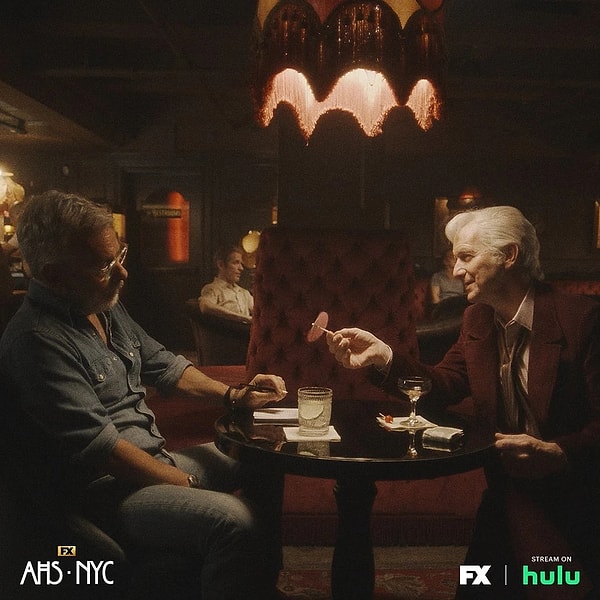
Courtesy of FX via Hulu
Henry
Predators thrive on decadence and excess.
-Henry, Episode 1 'Something's Coming'
Henry is a regular at The Brownstone, a piano bar in Manhattan. He's an art collector played by the incomparable Denis O'Hare, who wears finely tailored suits and talks about bygone eras. He came to New York when he was 13 years old. He was a runaway from Wyoming who walked the trails and hitchhiked, and he's seen a lot in his life. Men have tried to kill him, and he's lost friends and lovers. But he keeps his head down and he doesn't ask questions. That's how he's survived.
But he does have opinions, and he is willing to talk. He's watched the gay community change from a quiet, classy crowd who bought each other drinks before they went home with one another, to drugged-up rabbits, who screw anything that looks at them long enough. It's a small town vs big town, old vs young mindset. He sees crowds, sex shops, decadence, and excess, and he's not surprised that predators are on the loose. He also talks about the darkness as an idea. It's not clear whether or not he is a psychic, but he does see it. Perhaps his perception borders on psychism, or maybe he simply understands the nature of the world.
When Gino comes to speak with Henry, he says that he's seen the killer, picking off the queens who are too plump, too old, or too ugly, giving them a chance they never had. He doesn't know what the killer looks like. He says he's usually too drunk usually by the time they come in. Gino is drugged by a mai tai that Whitely sends to him while they're talking. After his abduction, he comes back to talk to Henry who confesses to seeing Whitely come into the bar.
Keşfet ile ziyaret ettiğin tüm kategorileri tek akışta gör!

Send Comment